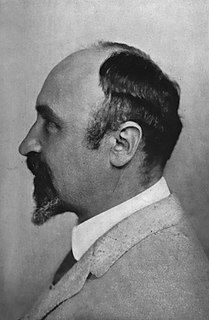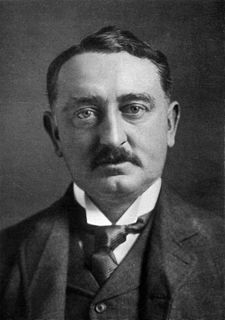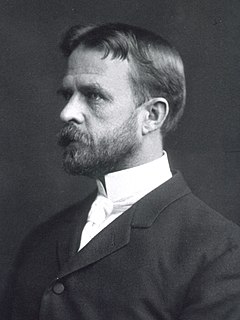A Quote by Leo Baekeland
If I had my life to live over again I would not devote it to develop new industrial processes: I would try to add my humble efforts to use Science to the betterment of the human race. I despair of the helter-skelter methods of our vaulted homo sapiens, misguided by his ignorance and his politicians. If we continue our ways, there is every possibility that the human race may follow the road of former living races of animals whose fossils proclaim that they were not fit to continue. Religion, laws and morals is not enough. We need more. Science can help us.
Quote Topics
Add
Again
Animals
Betterment
Continue
Despair
Develop
Devote
Efforts
Enough
Every
Fit
Follow
Former
Fossils
Had
Help
His
Homo Sapiens
Human
Human Race
Humble
Ignorance
Industrial
Laws
Life
Live
Living
May
Methods
Misguided
Morals
More
My Life
Need
New
Our
Over
Politicians
Possibility
Processes
Proclaim
Race
Races
Religion
Road
Sapiens
Science
Try
Us
Use
Ways
Were
Whose
Would
Related Quotes
The profound nature of our existence is that we are able at any moment to connect to anyone, anywhere. History is there to remind us of how far weve come, and every day our journey is to continue with that progress of becoming more wise, more compassionate and more considerate human beings. Remembering Emmett though song is way to remind people that there is no need to continue with senseless crimes. Race and racism do no go hand in hand. We are only one race: human.
We are persons whose bodies can be objectively studied according to the impersonal laws of physics but whose minds are subjectively experienced in ways science has not yet been able to fathom. In short, by radically seperating science from religion, we are not merely segregating two human institutions; we are fragmenting ourselves as individuals and as a society in ways that lead to deep, unresolved conflicts in terms of our view of the world, our values, and our way of life.
I contend that we are the finest race in the world and that the more of the world we inhabit the better it is for the human race. Just fancy those parts that are at present inhabited by the most despicable specimens of human beings what an alteration there would be if they were brought under Anglo-Saxon influence, look again at the extra employment a new country added to our dominions gives.
The paradox of the human condition is expressed more in education than elsewhere in human culture, because learning to learn has been and continues to be Homo Sapiens' most formidable evolutionary task... It must also be clear that we will never quite learn how to learn, for since Homo Sapiens is self-changing, and since the more culture changes the faster it changes, man's methods and rate of learning will never quite keep pace with his need to learn.
In this age of space flight, when we use the modern tools of science to advance into new regions of human activity, the Bible... remains in every way an up-to-date book. Our knowledge and use of the laws of nature that enable us to fly to the Moon also enable us to destroy our home planet with the atom bomb. Science itself does not address the question whether we should use the power at our disposal for good or for evil. The guidelines of what we ought to do are furnished in the moral law of God.
This is what the Mars Science Laboratory (MSL) represents. Experimental, explorational science. Learning about Mars as a new world. Discovering new things that will tell us about the history of our solar system, help reveal the secrets of life, and continue blazing the trail that may someday be traveled by the rest of us.
Development can indeed continue beyond childhood and youth, beyond the seventies. It can continue until the very end of life, given purposes that challenge and use our human abilities. . . . In sum, our development does not necessarily end at any age. We can continue to develop into our eighties, even to our nineties.
I often wonder: suppose we could begin life over again, knowing what we were doing? Suppose we could use one life, already ended, as a sort of rough draft for another? I think that every one of us would try, more than anything else, not to repeat himself, at the very least he would rearrange his manner of life, he would make sure of rooms like these, with flowers and light ... I have a wife and two daughters, my wife's health is delicate and so on and so on, and if I had to begin life all over again I would not marry. ... No, no!
That the fundamental aspects of heredity should have turned out to be so extraordinarily simple supports us in the hope that nature may, after all, be entirely approachable. Her much-advertised inscrutability has once more been found to be an illusion due to our ignorance. This is encouraging, for, if the world in which we live were as complicated as some of our friends would have us believe we might well despair that biology could ever become an exact science.
Science, by itself, cannot supply us with an ethic. It can show us how to achieve a given end, and it may show us that some ends cannot be achieved. But among ends that can be achieved our choice must be decided by other than purely scientific considerations. If a man were to say, "I hate the human race, and I think it would be a good thing if it were exterminated," we could say, "Well, my dear sir, let us begin the process with you." But this is hardly argument, and no amount of science could prove such a man mistaken.
What is the importance of human lives? Is it their continuing alive for so many years like animals in a menagerie? The value of a man cannot be judged by the number of diseases from which he escapes. The value of a man is in his human qualities: in his character, in his conscience, in the nobility and magnanimity, of his soul. Torturing animals to prolong human life has separated science from the most important thing that life has produced - the human conscience.





































